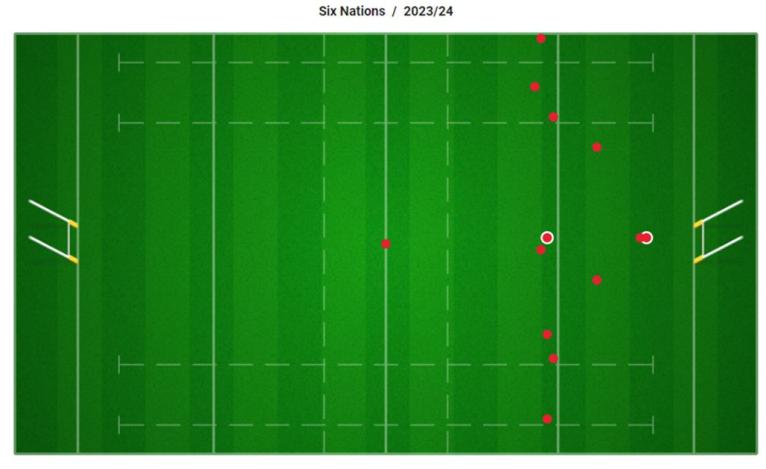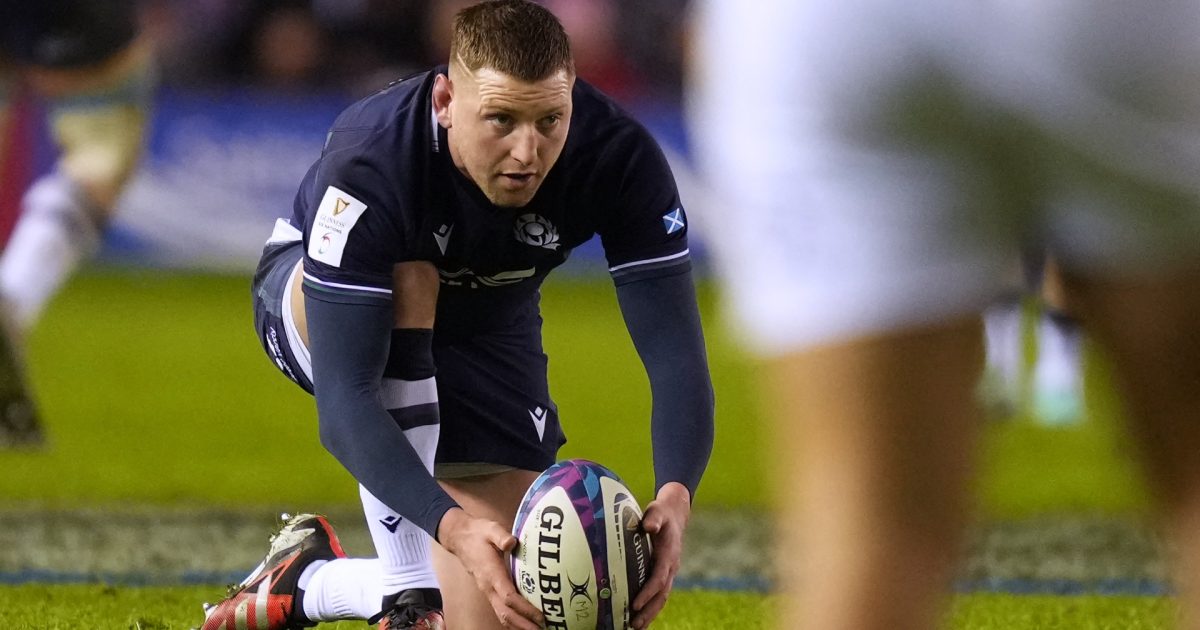Explained: The Finn Russell kicking masterclass for Scotland

Finn Russell can’t hit the proverbial barn door for Bath this season, but he has literally been kicking goals left, right and centre for Scotland in the Guinness Six Nations.
An Opta RugbyHub graphic below shows that 15 attempts have been made – from both sides of the pitch and down the middle – and with all 15 kicks successful, 38 points have been accrued.
No Scotland player has ever finished as the Six Nations top scorer; not even Chris Paterson, their greatest accumulator of points. But Russell is currently leading the field with four points more than England’s George Ford.
Paterson’s 35 consecutive kicks at goal is still a Six Nations record and he has been passing on his expertise as a consultant with the Scottish Rugby Union for the last 12 years, seven of them with the national team.
Russell is currently on a hot streak of 19 if you add the last four he kicked in the 2023 Six Nations to the 15 he has now, and another three successful kicks will put him a clear second behind his coach – but with a lot of daylight between them still.

“I think mine were easier; I only took the easy ones, apparently,” said Paterson to RugbyPass in a typical deprecating manner. “It [goal-kicking] is a big part of the game, it is a big responsibility. I would be absolutely delighted if he took it past that (record).”
Russell’s goal-kicking form with Scotland is in stark contrast to his record with his club Bath, which he addressed himself in a post-match interview with the BBC last Saturday after he had kicked six out of six to complement Duhan van der Merwe’s stunning try hat-trick in last Saturday’s 30-21 defeat of England.
The big-money summer signing is only operating at 64 per cent in the Gallagher Premiership and Investec Champions Cup combined – a far cry from his immaculate return at Test level despite the pressure being that much higher.
While swapping the sanctuary of Racing 92’s indoor arena for the wet and wild Recreation Ground on the banks of the River Avon may have something to do with it, it has left Russell a little non-plussed. “It’s been good this tournament,” Russell said referencing his kicking for Scotland.
“I have been struggling a bit at Bath, so I don’t know what the owner of Bath is going to say when I come up here and kick every kick. But down there I am struggling at about 60 per cent.”
Paterson knows inside the mind of Russell, the rugby player, better than most having worked with him from a young age. He said that thoughts of records and external things like his contrasting form for club and country will not enter Russell’s thinking when he lines up his next kick at goal against Italy on March 9.
“It’s a cliché but it is every kick on its own merit. Whether you are 10 points up or 20 points down, whether the game is in the balance and it is the first kick or the last kick, there is so much in your mind to think about. If you start thinking about things like that as well, it takes your focus off of it,” Paterson explained.
“I had a pretty defined process – three or four really key things that I would focus on so I didn’t have the mental capacity to add other things into the mix.
“You are aware of the run of the form you are in – people would remind me how long my streak was – but you are also aware that it could change in almost a second. So it is about treating it in that moment.”
Paterson delivered a fascinating breakdown into his four-step goal-kicking process, one that served him very well over an 11-year Test career that brought him a record 809 points for Scotland.
“I would slow my heart rate down, so sometimes I would walk deliberately slowly to get to the ball. Or if someone ran up and gave me the ball I would put it down on the ground and walk away just so that I could clear my head and slow my heart rate. And then I would line the kick up.
“People will say, keep your head down and look at the ball… but what does that mean? The key part of the next stage of the process for me was looking at the part of the ball I was going to kick.
“That would be something as definite as a stitch on the seam of the ball or where the blue part of the ball meets the white part of the ball … the smaller the detail I was looking at the better. Then, I would home in on that.
“Next, I would stay slow in my run-up. Sometimes you can start a run up slow but by the time you get to the ball, you might have quickened up a lot and your timing will be off. My left arm would hit my ear, which looked a bit strange, but that was another physical trigger that meant I knew the left side of my body was engaged in the kick and in the right position.
“And then once I had kicked, my hips would have to line up with the posts. If you can imagine it, my hip bones would finish perpendicular to the left and right posts. So that’s what I would be thinking about.
“As strict as I could adhere to that, it would take the emotion out of the kick because I got so into a zone. I found the more precise my routine was the more I was focused and the better chance I had of figuring out what might have gone wrong.
“So if I couldn’t see the part of the ball I wanted to hit, if my ear hadn’t been brushed by my arm, if my hips were to the left or the right of the posts once I had kicked the ball, I had a reference point when it came to fixing it.”
Duhan van der Merwe's hat-trick grabbed the Six Nations limelight in Edinburgh, but Scotland boss Gregor Townsend wasn't forgetting the important points added from the boot of Finn Russell. #SCOvENG #ScotlandRugby #GuinnessM6N pic.twitter.com/bCSxOxvum7
— RugbyPass (@RugbyPass) February 26, 2024
With Russell, there appears to be much more of a ‘feel’ element to his goal-kicking – like the rest of his general play – than it is purely about the process. Paterson pointed out that every kicker is different in their approach but can still be equally metronomic in terms of the end result.
He added that the one thing that sets Russell apart as a world-class goal-kicker is his ability to instantly assess his performance every time he steps up for his country. “Two things, he works really, really hard at it, which everyone does.
“But he is also really good at evaluating what he has done right or wrong. He knows immediately from the feel, of the kick. For me, the best kickers are those who can evaluate precisely what has happened. Now, sometimes the kick has gone over and you have to evaluate and think, I got lucky there. Sometimes you miss a kick and you think, I actually struck that pretty well.
“It is really important to have a list of checks and balances that enable you to evaluate why you have missed a kick or not struck it well and what needs to change. If you miss a kick and don’t know why, the next one is more difficult because you can be left wondering what did I do?”
For Bath, Russell has missed 14 of his 32 conversion attempts this season with Paterson claiming that the geography of some of those kicks has played its part.
England A winger Will Muir has made a habit of scoring in the corner of The Rec where the exposed temporary East Stand meets the Sports Centre end. Bath are also not shy of scoring from mauls, which invariably are finished out wide.
“I have a system where I have an inner arc and an outer arc. The inner arc is from the 15-metre line back to the 40 and everything there; that is where you really have to nail them. You’re looking at 90 per cent,” he explained.
“Then you have a lesser expectation – maybe around 60-65 per cent as a minimum outside of that, and that includes long-range penalties. When you break down where kicks are from, a lot of them for Bath are wider out.
“Before the weekend, most of his kicks (for Scotland) would have been in that inner arc that I have spoken about, whereas on the weekend (against England), three or four were kind of in the outer arc.”
Confidence is often talked about as a key aspect of goal-kicking. Sometimes a lack of it is visible in the ashen-faced look of a player as they eye up the posts or the twitchiness of their stance before the approach to the ball, while those in the rhythm of their lives have an air about them where you’d bet your mortgage on them not missing.
Russell currently falls into the latter category. Kicking off under the closed roof of the Principality Stadium at the start of February would have made him feel right at home given the four years he spent within a similarly enclosed environment at Racing.
He followed up his flawless display in Wales with two more at Murrayfield, a ground where there is probably not one blade of grass he doesn’t know. “He is in a good place at the moment,” Paterson agreed.
“The confidence you have built up is a good thing, of course it is, but it just gives you the confidence to understand what you are doing is working. He has kicked well for a long time and he is getting an opportunity to show that at the highest level. Long may it continue.”




































































